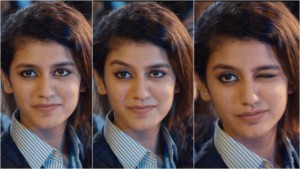 It took one wink and smile to make debutant actress Priya Prakash Varrier an overnight sensation.
It took one wink and smile to make debutant actress Priya Prakash Varrier an overnight sensation.
Priya is an 18-year-old Com student from Kerala’s Thrissur who is acting in the film Oru Adaar Love. In the song, Manikya Malaraya Poovi from the film we get to see Priya smiling and winking at her high-school crush in the video. Within a matter of hours, memes and gifs, flooded timelines, and no one could get over Priya and her wink.
Even Priya Prakash Varrier wouldn’t have thought her wink would go this viral that she would not only become an overnight internet sensation but also enter Bollywood thanks to the video. Featuring in the now popular song from the movie Oru Adaar Love, Priya is set to make her acting debut in the Malayalam film industry in June this year.
But it now seems that it is not just Malayalam audience she might woo this year. According to Deccan Chronicle, the teenage actress has got directors knocking on her door hoping to cast her in an upcoming Bollywood movie and marking her Hindi film debut.
Talking to International Business Times India, Priya expressed that she wanted to work with Sanjay Leela Bhansali. She said, “[I would love to work with] Sanjay Leela Bhansali. I saw his latest film Padmaavat and fell in love. I adore his craft.”
While it might take the 18-year-old a little longer to achieve her dream of working in an SLB extravagant, DC reports suggest that there are several other directors who have her phone ringing.
“She is an Internet sensation and everyone wants to cast her, knowing the fact that she’s bankable today. Considering that she also speaks Hindi well, she’s been approached by a few Hindi filmmakers already,” sources from the industry have said.
Priya proved her bankability when Malayalam director Omar Lulu, who is at the helm of Oru Adaar Love, released the teaser of the movie with just Priya and the viral boy, Roshan Abdul only to garner 13 million views (at the time of reporting) in five days.
A classical performer, Priya is a multi-talented star and her Instagram account is a proof. The actress has shared pictures from her dance performances and videos where she’s seen crooning to a few Bollywood hit numbers.
In 30 seconds, Priya Varrier has achieved a thousand milestones. The short clip of a schoolgirl and a schoolboy exchanging flirtatious glances has not only become 2018’s biggest meme, it’s made a debutant actress a social media sensation overnight.
The video winked its way into the headlines for an audience which was thirsting for some relief from terror and ‘neech’ politics. It made us feel – for a brief 30 seconds- that we weren’t our cynical, insecure selves but passionate, confident, joyous and above all, young. Ah, to be sixteen and to have the whole world before you in a mad sweep of potential. And to be totally and confidently unaware of it too. That’s the real secret of the eyebrows that launched a thousand memes. Not the mash-ups with Arvind Kejriwal and Donald Trump (and to be honest, once you’ve seen one politician raising his eyebrows, you’ve seen them all) but the way it presses rewind on our collective consciousness.
Calls for ban
But this is India. Politics is mother’s milk to us. And if you can’t raise eyebrows with a video of raising eyebrows, well, you may as well go to Pakistan. So within 24 hours of Priya Varrier’s TV interviews, the slugfests were in full swing.
Islamic groups demanded a ban on the song featuring Priya Varrier’s dancing eyebrows, not really because of the eyebrows, but because of the lyrics of the song. It’s a rendition of an old Mappila song, performed by a student at a school fest – as other students are shown discovering love. The song itself talks about how Prophet Mohammed’s wife fell in love with him at first sight and took the initiative to propose marriage. Wow! Who knew that the Prophet’s wife may have been the first feminist? And would such a spirited lady have approved of these fatwas? As the young actress told CNN-News18 in an interview well before the fatwas, and the frothing at the mouth began: ‘Why should boys have all the fun?’ Or, to put it another way, why should the patriarchs get to issue all the fatwas?







